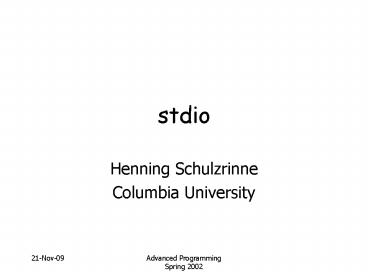Advanced Programming - PowerPoint PPT Presentation
Advanced Programming
Low-level Unix (and Windows) I/O: numeric file descriptor (file handle) first for Unix, now ANSI C. handles ... buffer allocation: read into large buffer, dump ... – PowerPoint PPT presentation
Title: Advanced Programming
1
stdio
- Henning Schulzrinne
- Columbia University
2
stream model
- Low-level Unix (and Windows) I/O numeric file
descriptor (file handle) - first for Unix, now ANSI C
- handles
- buffer allocation read into large buffer, dump
to OS in fixed units - performs I/O in optimal-sized chunks
- usually, much more efficient than system calls
(read, write) - fewer system calls
3
Streams
- stdio library manipulates streams
- associate stream with file
- works for files, but also interprocess
communications - fopen returns pointer to FILE object (file
pointer) - file descriptor
- pointer to buffer
4
Buffering
- minimal number of read() and write()
- fully buffered I/O buffer is filled
- line-buffered newline character
- unbuffered as soon as possible
- void setbuf(FILE fp, char buf) // BUFSIZE or
NULL - void setvbuf(FILE fp, char buf, int mode,
size_t size) - int fflush(FILE fp)
5
Positioning a stream
- ftell() and fseek() 32-bit offset
- long ftell(FILE fp)
- int fseek(FILE fp, long offset, int whence) //
SEEK_SET, SEEK_CUR, SEEK_END - void rewind(FILE fp)
- get and set (opaque position!)
- int fgetpos(FILE fp, fpos_t pos)
- int fsetpos(FILE fp, const fpos_t pos)
PowerShow.com is a leading presentation sharing website. It has millions of presentations already uploaded and available with 1,000s more being uploaded by its users every day. Whatever your area of interest, here you’ll be able to find and view presentations you’ll love and possibly download. And, best of all, it is completely free and easy to use.
You might even have a presentation you’d like to share with others. If so, just upload it to PowerShow.com. We’ll convert it to an HTML5 slideshow that includes all the media types you’ve already added: audio, video, music, pictures, animations and transition effects. Then you can share it with your target audience as well as PowerShow.com’s millions of monthly visitors. And, again, it’s all free.
About the Developers
PowerShow.com is brought to you by CrystalGraphics, the award-winning developer and market-leading publisher of rich-media enhancement products for presentations. Our product offerings include millions of PowerPoint templates, diagrams, animated 3D characters and more.































